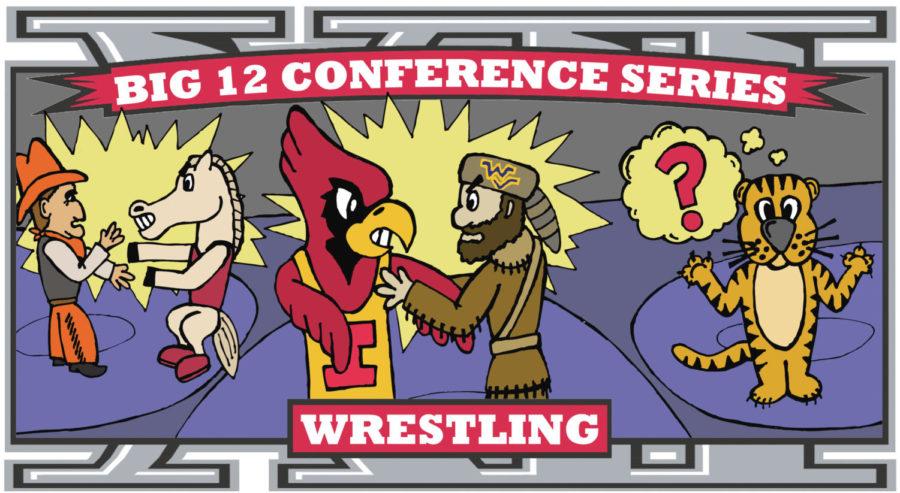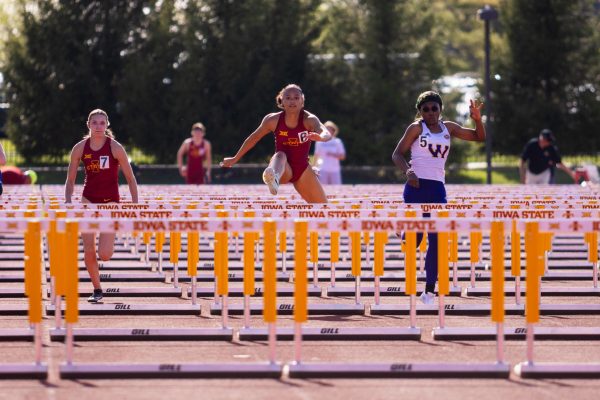Big 12 Series: Wrestling with conference realignment
Illustration: Ryan Francois/Iowa State Daily
ISU wrestling already faces few teams during regular conference meets, but with the departure of schools from the Big 12, Iowa State may have to travel farther and wider than before to face competition.
April 8, 2012
When Texas A&M announced last September it would leave the Big 12 Conference, the wrestling teams did not bat an eye.
The Big 12 has wrestled with less than six teams since 1980 and has operated its conference championship with an exception granted to be able to do so. And since A&M has never had a wrestling team, the news of their impending departure was irrelevant to Big 12 wrestling.
However, when Missouri announced in November that it would follow Texas A&M to the Southeastern Conference, the collective attention of the Big 12 wrestling community heightened. Missouri’s departure creates a barrage of questions since the SEC has not had any teams with wrestling since the late 1980s.
“There are a lot of things on the table that have to be discussed,” said ISU coach Kevin Jackson. “We feel it is very important to have a conference with a number of teams.”
The departure of Nebraska after the 2010-11 athletic season served as a scare for the Big 12, which went from five to four teams in wrestling as a result.
The Big 12, however, was granted permission that allowed it to continue hosting its conference championship this season two teams under the six required minimum to do so.
Filling Missouri’s void will not be an issue since West Virginia — one of the Big 12’s two additions to the conference — has a varsity wrestling team that will be joining the conference next season.
The main issue persisting in the minds of wrestling fans is where West Virginia will fit into the Big 12 and where Missouri will go if it does not go back.
Hello Mountaineers, Goodbye Tigers?
Missouri’s uncertain future brings up the issue of where it will compete if it does not return to the Big 12 for wrestling. One option would be to compete in the Western Wrestling Conference — which currently hosts Iowa State’s in-state rival Northern Iowa, as well as other schools in the Midwest that do not have conference affiliations for the sport.
Oklahoma State coach John Smith said he would like the Big 12 to take a look at Missouri’s current situation.
“With Missouri going to the Southeastern Conference — there’s not a lot of wrestling down there — maybe we can keep them,” Smith said when his team visited Ames in November. “If not, I like that we added West Virginia.”
While the realignment discussions centered primarily around football and the money associated with it, Smith believes West Virginia having wrestling helped their case. He added that he knows wrestling was important to many people during discussions within the Big 12.
Both Smith and Jackson said their recruiting is already very important in the Eastern part of the country, but acknowledged that competing in West Virginia would help their efforts.
“It’s an hour outside the strongest state in the sport of wrestling, which is Pennsylvania,” Smith said. “It’s the best wrestling right now in the country in high school. So it’s good for us to be able to get some exposure up there by wrestling them.”
Smith said the primary reason competition with the Mountaineers would be beneficial is because it would allow recruits from that area of the country to watch his team — along with the other remaining members of the Big 12 — without traveling.
Whether Missouri will be a part of those teams remains a major uncertainty.
Mapping out a possible shift to regionals
Seven months currently stand in between now and next season, giving the Big 12 time to figure out what it wants to do until then with Missouri in limbo.
“We’ve been in communication with our coaches in terms of future alignment options,” said Bob Burda, Big 12 associate commissioner of communications. “[We’re] working to do what’s in the best interest of our continuing members moving forward for the sport of wrestling.
“At this juncture, the conversations have been very conceptual to get the process started. We haven’t drilled down to considering specific options yet.”
Burda, official wrestling liaison for the Big 12, said the sport is considering the installment of a regional format similar to other NCAA sports that host regional competition prior to nationals.
Burda said it is too early to tell whether the possible establishment of regionals would completely abolish the conferences currently in place. However, Jackson said there will always be conferences.
“We’re never not going to compete for a conference title,” Jackson said. “We just don’t know what that looks like or if there will be adjustments made sooner than later.”
The issue of national qualifiers muddies up the discussion — if wrestlers now have to qualify for the national tournament at regionals, what will happen to conference tournaments?
“The way I understand it, if you went to regional qualifiers, then there would no longer be, potentially, conference championships,” Burda said. “Let’s say that you set it up as four regional qualifiers, you’d have to divide the country up geographically.”
The current format uses the wrestlers’ regular season success to determine how many automatic qualifiers will be allocated to that wrestler’s conference. In terms of how that would play out in a regional format, Burda said that’s one of the topics of discussion among coaches right now.
“There’s no telling right now where the ‘regionalization’ concept is going to go,” Burda said. “It’s off the ground, but it is one of the concepts that is being discussed.”
The travel factor
Regardless of what happens when the Big 12 coaches meet in May to discuss the possibility of regionals — among other things — it is likely that the Cyclones will find Morgantown, W.Va., as a destination some 870-plus miles east next season. The trip will be nearly 300 miles farther than Iowa State’s closest conference meet last season.
Jackson, along with Smith and Oklahoma coach Mark Cody, all shared a similar sentiment and do not feel the added travel will be an issue.
“I don’t think there’s any difference; we’ve traveled to Cornell and Arizona State,” Jackson said. “It’s not anything that we’re concerned with.”
Cody said the Sooners already conserved in the past season compared to years past. Oklahoma flew to Ames two seasons ago, but made the trip via bus last November.
“Budget-wise I think all schools in the Big 12 are OK, and I think they can handle a trip [to West Virginia],” Cody said. “You just have to do it ahead of time and try to get the deals — and that’s what we do, we try to save money.”
David Harris, ISU senior associate athletic director, who focuses on wrestling for the athletic department, said getting the most out of trips is also something Iowa State will try to do.
“Last season we started off in Boston, and we had Army and Boston,” Harris said. “If we know we’re going to be wrestling at Cornell [for example], if there’s another school out there that we can combine and do a dual meet with, that presents an opportunity to go out there one time but get two competitions in and only have the expense for one [we’ll do that].”
Harris said the Cyclones took a commercial flight to Old Dominion last season, adding that those decisions are made based on transportation and budget needs once they figure out who is on the schedule.
“We’ll budget accordingly,” Harris said. “We’ll take a look at where Kevin feels are the best places for us to have competitions [and go from there].”
Whether that will include Missouri next season as a conference opponent remains to be seen.

















